
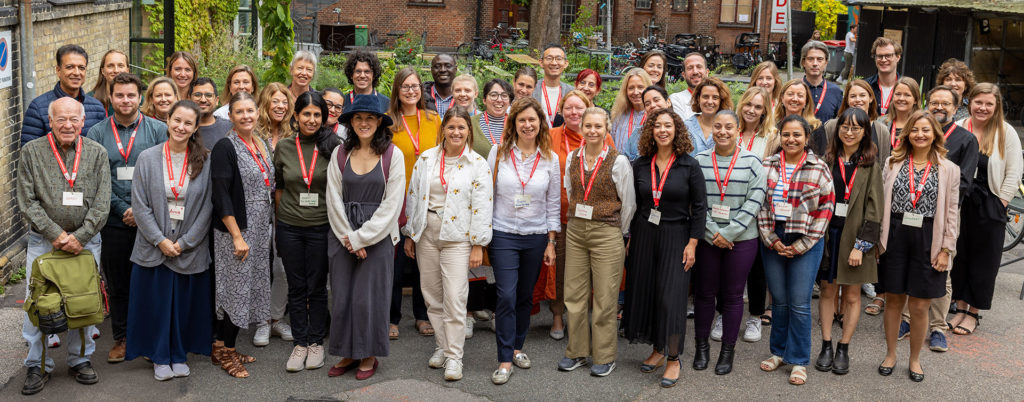
In December 2019, the International Red Cross Red Crescent Movement adopted a set of commitments addressing mental health and psychosocial needs. A Roadmap (2020–2023) has been developed to support a strategic and coordinated approach to the implementation of these commitments, with the aim to strengthen the Movement’s collective response to mental health and psychosocial needs.
Research is crucial to ensuring the realisation of the Roadmap ambitions. In particular, Priority Action Area 4 of the Roadmap focuses on ‘Demonstrating the impact of MHPSS interventions through research, evidence, monitoring and evaluation’. The Research Network will be instrumental in supporting this by highlighting and showcasing best practices across the Red Cross Red Crescent Movement.
The Red Cross Red Crescent Research Network was established in June 2016 with the vision to provide effective humanitarian action through a strengthened evidence-base in the Red Cross Red Crescent Movement for MHPSS for beneficiaries, volunteers and staff.
The Research Network is a space for collaboration and shared learning that brings together MHPSS researchers and practitioners affiliated with the Red Cross Red Crescent Movement. Hosted by the RCRC Movement MHPSS Hub and co-led by the British Red Cross, the Research Network:
The Research Network is seeking to connect with National Societies and other stakeholders who are interested in research and who would like to explore potential for research partnerships on mental health and psychosocial support in humanitarian settings.
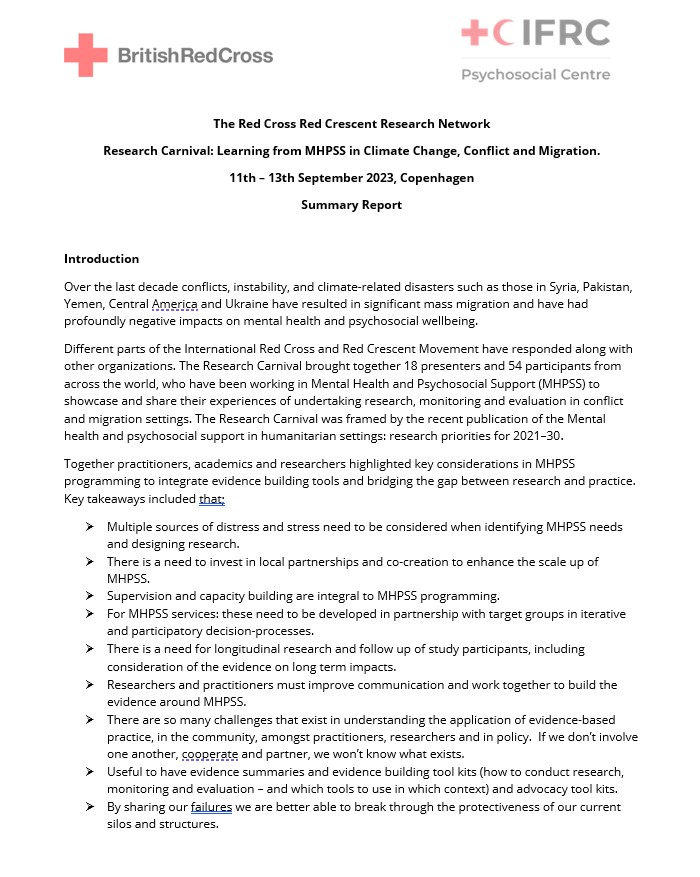
Over the last decade conflicts, instability, and climate-related disasters such as those in Syria, Pakistan, Yemen, Central America and Ukraine have resulted in significant mass migration and have had profoundly negative impacts on mental health and psychosocial wellbeing.
Different parts of the International Red Cross and Red Crescent Movement have responded along with other organisations. The Research Carnival brought together 18 presenters and 54 participants from across the world, who have been working in Mental Health and Psychosocial Support (MHPSS) to showcase and share their experiences of undertaking research, monitoring and evaluation in conflict and migration settings. The Research Carnival was framed by the recent publication of the Mental health and psychosocial support in humanitarian settings: research priorities for 2021–30.
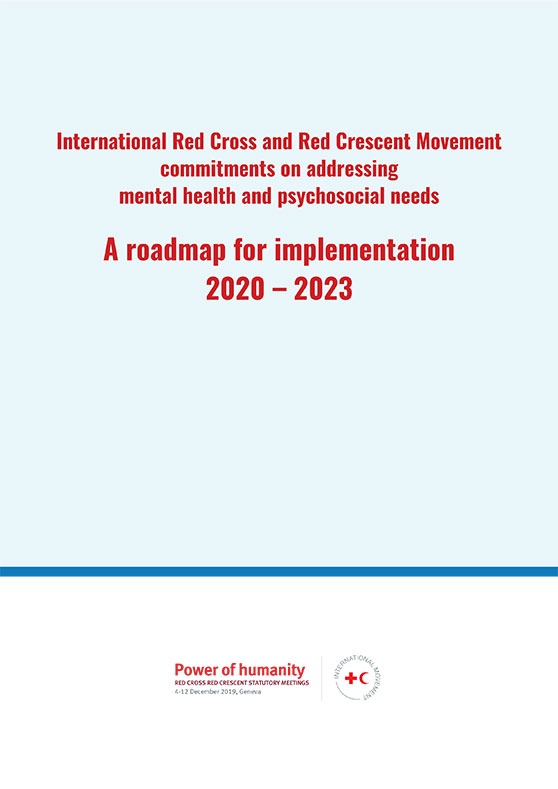
In December 2019, the International Red Cross Red Crescent Movement adopted a set of commitments addressing mental health and psychosocial needs, including resolution 2 of the 33rd International Conference of the Red Cross and Red Crescent Movement. This roadmap (2020–2023) has been developed to supports a strategic and coordinated approach to implementation of these commitments, with the aim to strengthen the Movement’s collective response to mental health and psychosocial needs.
In 2019, the International Red Cross and Red Crescent Movement adopted a set of commitments for addressing mental health and psychosocial support (MHPSS) needs, holding the National Societies, the IFRC, and the ICRC accountable for guaranteeing a basic level of psychosocial support. Integrating MHPSS across sectors allows the Movement components to reach more people and ensure that persons in need of more specialized MHPSS services are identified and properly referred. Integration is also critical to reducing stigma, discrimination and exclusion.
This webinar focuses on the insights and recommendations of a consultation process carried out by Working Group 1 of the MHPSS Roadmap (co-lead by Shona Whitton, Technical Advisor at the IFRC PS Centre and Sarah Davidson, Head of Psychosocial and Mental Health at the British Red Cross) with 35 practitioners from National Societies, the ICRC and the IFRC, who have been involved in integrating MHPSS activities within the Movement. Two of the participating National Societies talk about their challenges and experiences with the integration of MHPSS approaches and services into an epidemic response and in an emergency response setting.
The presenters are:
Presentations
There is an enormous gap in human resources for mental health and psychosocial support at a global level. The ramifications of this gap are magnified in situations of armed conflict, natural disasters and other emergencies, where needs intensify and healthcare systems are overwhelmed. Accordingly, there is a need for innovative and promising MHPSS approaches that can reach more people affected in the most cost-effective way possible. In contexts where resources are scarce, access is limited, and gaps in service provision are high, digital psychological and psychosocial support services open up ways of connecting with more people in need. They provide a scalable and resource-efficient extension of traditional approaches to mental health care and psychosocial support.
This webinar provides an overview of the current state of research on digital MHPSS, discusses challenges with the development and the implementation of a scalable technology-empowered service and gives insights into the results of a very recent RCT on the acceptance and effectiveness of the Sui SRK App, a digital psychosocial intervention for refugees in Switzerland, developed and implemented by the Swiss Red Cross.
The presenters are:
Viktoria Zöllner, a Project Manager at the Swiss Red Cross for digital MHPSS, holding a master’s in psychology. She is co-leading the SRC project ‘Digital psychological and psychosocial support for refugees in Switzerland’ as part of which the Sui SRK app was developed.Rilana Stöckli, a PhD student of psychology at the University of Bern, was leading the research project concerning the process of cultural adaptation and conducting the RCT on the acceptance and effectiveness of the Sui SRK App.
Online workshop with representatives from the International Journal of First Aid Education (IJFAE) explaining the process for submitting to the IJFAE specifically. The session allowed participants to socialize their ideas around the Chain of Survival Behaviors, articulate key messages, and begin to outline a manuscript.
Climate change contributes to and exacerbates a range of humanitarian crises for populations in every region of the world. The direct and indirect impacts on mental health and well-being at individual and community levels are concerning and often neglected.
In 2023, the International Federation of Red Cross and Red Crescent Societies (IFRC) Reference Centre for Psychosocial Support initiated a consultation process with the aim to better understand the intersection between mental health and psychosocial support (MHPSS) and climate change in the work of National Societies. This webinar presents a high-level overview of the climate-related mental health risks as identified by the consulted National Societies and discusses potential pathways to addressing the mental health and psychosocial challenges arising from the climate crisis.
The presenters are:
Shona Whitton, a Technical Advisor in Mental Health and Psychosocial Support at the IFRC’s Psychosocial Centre specialising in MHPSS in emergencies, climate change and protection, gender and inclusion.
And Finja Katharina Daegling, a Consultant at the IFRC’s Psychosocial Centre with a focus on the complex psychosocial impact of the climate crisis on mental health and well-being.
The concept of moral injury has become increasingly popular over the past years to describe“the lasting psychological, social and spiritual harm caused by actions that transgress a person’s deeply held moral beliefs and expectations“ But what does that actually mean? In this webinar, we unpack the concept of moral injury by asking three key questions:
This webinar address these questions.
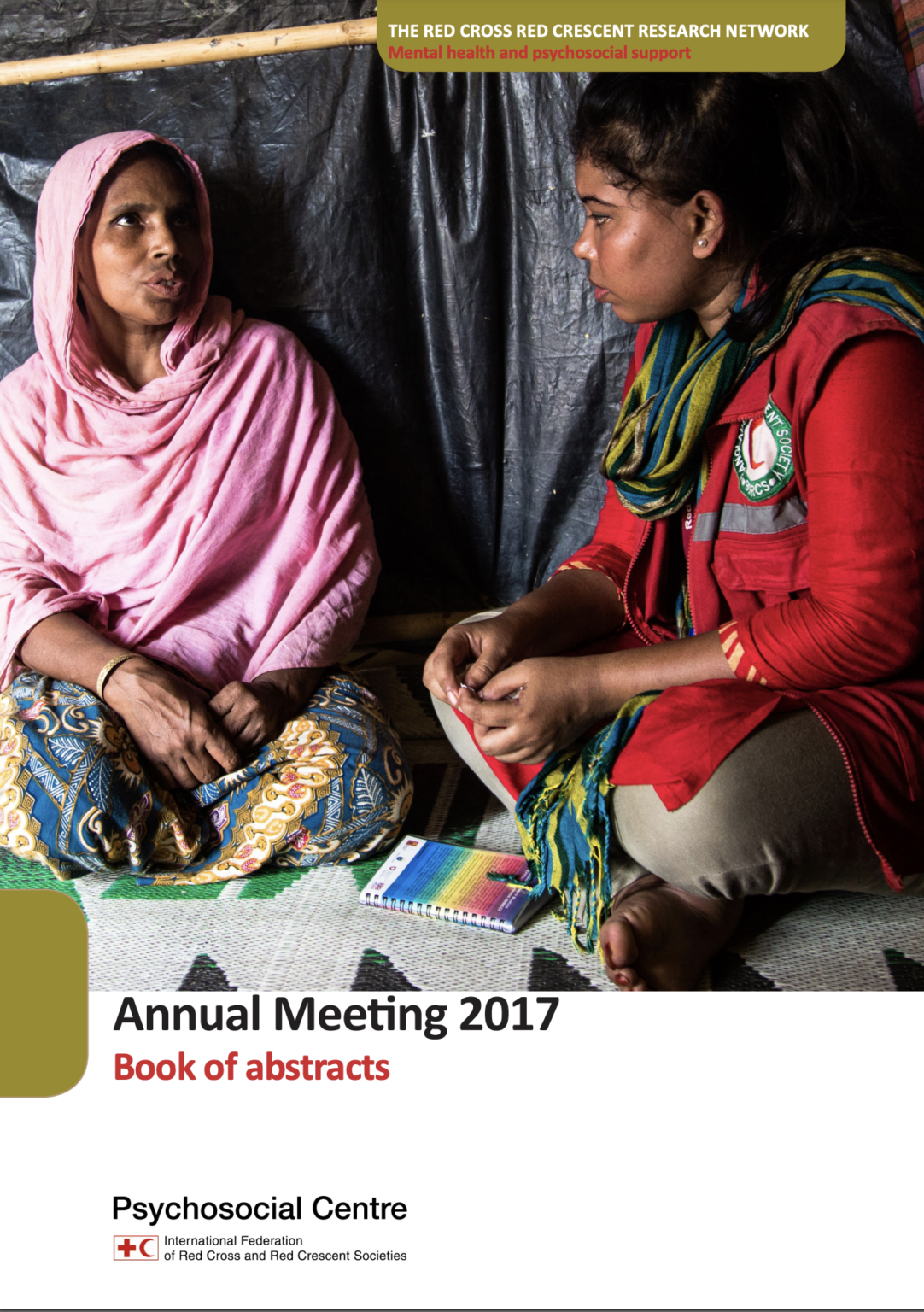
Throughout the Red Cross Red Crescent Movement and the wider humanitarian community there is an increasing recognition of the need for building evidence to support mental health and psychosocial support (MHPSS) interventions. The 2017 Council of Delegates of the Red Cross Red Crescent Movement passed the resolution Addressing Mental Health and Psychosocial Needs, which urges the Movement to increase their efforts to better understand the needs and challenges, and to collect evidence on MHPSS interventions in humanitarian responses.
The 2017 Annual Meeting of the Red Cross Red Crescent Research Network on Mental Health and Psychosocial Support brought together 32 people from 16 countries to share their research experience on two themes: mental health of refugees, migrants and asylum seekers and caring for staff and volunteers. The annual meeting was a combination of key note speakers, abstract presenters and workshops.
The book of abstracts includes the abstracts presented at the annual meeting. The range of abstracts reflect a growing interest for and experience with conducting research on MHPSS within the Red Cross Red Crescent Movement and we hope that other practitioners and researchers from within and outside the Movement will be inspired by and learn from the research presented in this book of abstract and that more people will join the research network in the coming years.
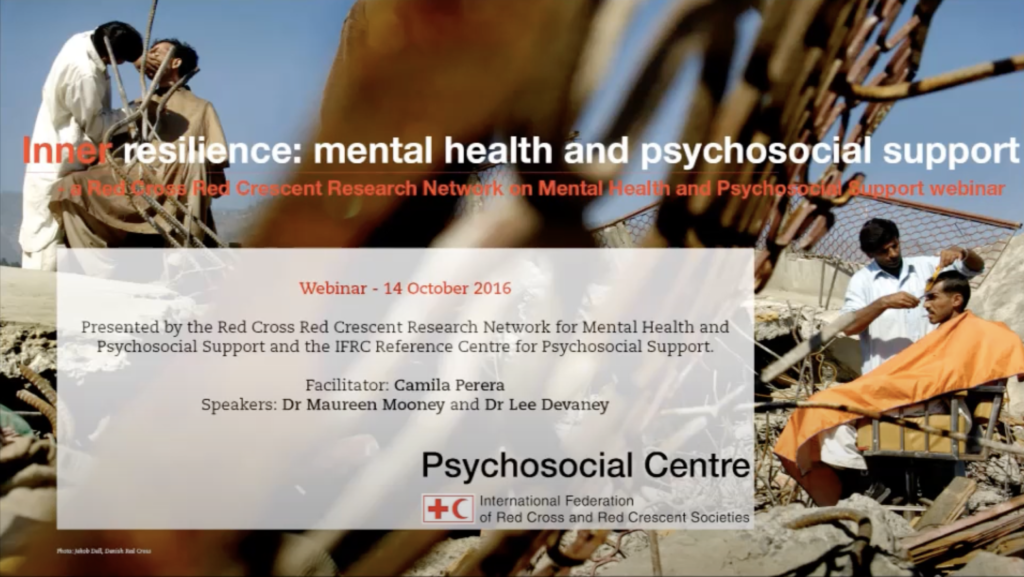
A three part webinar series on Inner Resilience – Mental health and psychosocial support
In 2007, Stevan E. Hobfoll published a key article on post-disaster psychosocial support with a team of international experts Five essential elements of immediate and mid-term mass trauma interventions: Empirical evidence. Accordingly, psychosocial support after disasters or other traumatic events should promote five essential principles:
Sense of safety, Calming, Self- and community efficacy, Social connectedness, Hope
In the 10 years following their publication, the five essential principles have been extremely influential among practitioners, researchers and policy makers around the world. But how have the five principles been used, or misused? Are they useful and appropriate in measuring outcomes of psychosocial interventions? And what is next for MHPSS research?
In conversation with Dr. Leslie Snider, Dr. Stevan E. Hobfoll examines these questions during a one-hour webinar hosted by the Red Cross Red Crescent Research Network on Mental Health and Psychosocial Support.
Red Cross Red Crescent Movement MHPSS Hub
Hejrevej 30, st.
2400 Copenhagen NV
Denmark
Site language:
